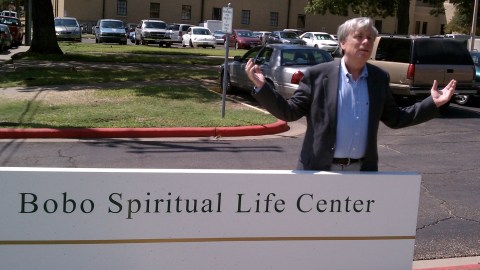Self-Help for Higher Education: Should Large Research Institutions Be Avoided?

“How to Make the Most of Your College Education” has become a popular blogging theme. Megan McArdle got things started this time, but the most sensible contribution has come from the professor writing under the name Cattle King. All I’m going to do is comment one portion of King’s “two cents”:
Avoid large research institutions? Sure. You only go to college once. And the priorities of the place will have little to nothing to do with YOU. It turns out to be hard to graduate in four years in such a “warehouse” environment. It’s not that the courses are hard, but it’s a lot more difficult to find your place and figure out what you need to be doing. Well, here’s another reason: Large research universities are typically located in great towns—such as Athens, GA or Charlottesville, VA. Why would you want to leave? But you can’t get much of a job there—too much competition. So just don’t graduate. Change your major one more time. Or hang around and get a graduate degree that, for you, becomes ridiculously extended adolescence.
Point in the other direction: If YOU (meaning the kid choosing a college) are savvy and mature beyond your years, have excellent academic skills, and really are in love with learning, you can find what you need and want somewhere in almost any basically mediocre, techno-specialized, and mindlessly politically correct university. If you take an interest in a professor for the right reasons, he or she, at least once in a while, will take in an interest in you. And you can find what you want at a very low cost while enjoying the cultural amenities and diverse (in a way) community of your university town. There are various self-help guides that can tell you who the decent professors are at this or that warehouse university. There should be more and better such guides. We can even add: It may well be the case that, say, the historians at a major research university are more talented and just know that those found at “backwater” colleges. They are often more famous or highly regarded for good reasons. This is a rule that doubtless admits of a significant number of exceptions, but you know what exceptions prove.
Another point in the other direction: If you’re have the aspiration to be a research scientist or theoretical physicist or something similar, it’s at the research university that you’ll be in contact with the world-class scientists doing the cutting-edge research. I know undergraduate colleges are pushing the idea of undergraduate research. Professors at mere colleges might well be more likely to involve undergraduates in their work, given that they don’t have graduate students. But the research won’t be as groundbreaking or funded as well, and the professor’s job isn’t or shouldn’t or just can’t mainly be about cutting-edge research. Not to mention: the facilities, equipment, and such at the four-year college usually won’t be as good. So my general advice to some budding Sheldon Cooper is to go to the place where the best physicists are, and then work as hard as you can to get in good with them.
The “undergraduate research” model may make some sense in the “hard sciences,” but it distorts the social sciences and the humanities in ways that might actually undermine the singular claims of liberal arts colleges. I asked a fine biology professor here at my college about the ten best books in his field. He responded: there really aren’t any books, but I can tell you about the ten best “papers.” That means, of course, that the sciences aren’t really oriented by the achievements of the past—by Aristotle or Newton or whomever—but mainly build on the assumptions of the reigning “paradigm,” which they believe they have good reasons to believe is superior to its predecessors.
But to treat, say, political science as a science in that way is a profound disservice to students. They come to believe that the road to the cutting edge doesn’t require the careful mastery of a huge number of great or at least “real” books, and they come to specialize too quickly in order to a “research contribution” too easily. What they’re bypassing, of course, is “liberal education”—which means Plato, Aristotle, Locke, Tocqueville, The Federalist, and such. (This bypassing tendency is even found in what should be the more traditional discipline of “Englilsh” or literature. Being on the cutting edge means being in touch with the latest form of critical theory—with, say, Derrida. But Derrida himself wrote that if you read Aristotle for ten years and Nietzsche than another ten, then you might be ready to really benefit from reading me.)
The result is students end up with the dumb opinion that political scientists today have simply displaced the contributions of the past; they end up stuck in an academically dominant but, truthfully, not-so-impressive techno-paradigm (such as rational choice theory). They end up, ironically, knowing less about the real world and human psychology than they might have known had they resisted or been led to resist the temptation of scientific specialization.
They end up dissing in ignorance what has been, historically, the singular contribution of the brick-and-mortar, four-year college in the development of American leaders and scholars: an informed understanding of each of us as a whole human being living in a particular place and as part of moral and intellectual tradition.
This dissing of liberal education ends up feeding off itself. Students go on to grad school too eager to get right down to publishing without knowing all that much. They return to liberal arts colleges hyper-specialized and without the broad knowledge that comes through broad reading. So they want to teach their specialization and little more to undergrads, and they want their students to be competent little researchers like themselves. That means, in fact, that our professors and students know more and more about less and less, and they become progressively less equipped to prepare students and anyone else they might influence to become anything more than “specialists without heart.”
So the argument for avoiding large research institutions depends on the smaller colleges believing they have a distinctive method that goes beyond “small classes” and “engagement.”
In the absence of that argument, it’s hard to see why the virtues—having to do with research, diversity, and low-cost—of the large university don’t trump those of the small college. I hope Cattle King remains right because our colleges don’t continue to lose confidence in what they’re about and what the foundation of higher education really is.





